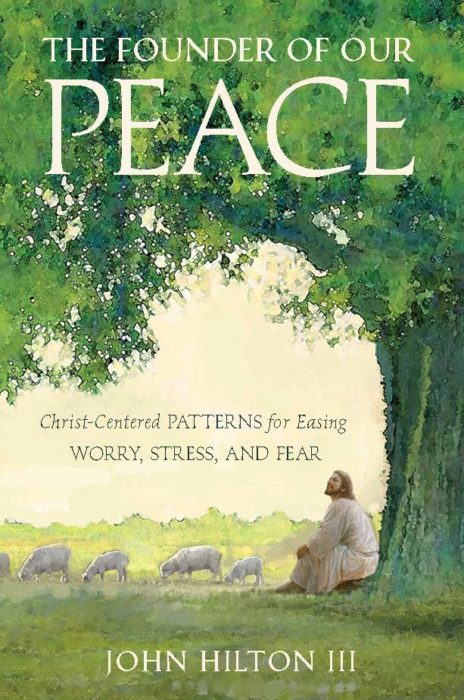Podcast: Play in new window | Download | Embed
John Hilton III was born in San Francisco and grew up in Seattle. He served a mission in Denver, and got a Bachelor’s degree from Brigham Young University. While there he met his wife Lani and they have six children. They have lived in Boise, Boston, Miami, Mexico, Jerusalem and China. Currently, they live in Utah. John has a Masters degree from Harvard and a Ph.D from BYU, both in Education. John is a Professor of Religious Education at BYU. John has published several books with Deseret Book, most recently, The Founder of our Peace, and enjoys speaking at Education Week, and other places. His education research has influenced policy both in the United States and internationally. John loves being with his family, doing humanitarian work, learning Chinese, and performing magic.
Highlights
7:04: John quotes President Uchtdorf in which the former addresses the many “shoulds” and “should nots” that become a challenge in our lives. We can lose peace in our lives when we focus on admittedly good ideas, but aren’t grounded in the Gospel of Jesus Christ. 8:50: What are “Fence Laws”? Imagine an unfillable hole in your backyard, which poses a threat to children who may fall in. You therefore put a fence around this hole, which represents sin. The fence represents the protective effort against anybody falling into the sin. 9:45: We are already protected from sins by commandments, which John refers to as “core laws”. Yet some still feel the need to add additional “fence laws”. E.g.:
- Core Law: The law of chastity, i.e., no sexual relations outside of marriage.
- Fence Law: No kissing until the fourth date, and kiss will last no longer than five seconds.
- Fence Law: No going into the bedroom of a member of the opposite sex.
10:47: Some fence laws have prophetic sources, like those found in the For the Strength of Youth, etc. There is a goodness to fence laws as guided by the spirit or other divine sources, like prophets. 13:57: Examples of positive fence laws. 15:22: Dangers of focusing on the fence laws while forgetting the commandments: “I didn’t go into the bedroom of a member of the opposite sex, but I still broke the law of chastity.” Children need fences, but the choices should shift away from extrinsic fences to self-imposed fences. 16:50: Too many good fences can become a burden. 22:58: “Take my yoke upon you” meaning. 25:49: Ward traditions that become fences. 28:56: Allowing the spirit to fill in the details around prophetic direction. 30:14: Anecdotes where a personal fences law caused harm:
- Unrighteous judgment
- Offending others
- Teaching others incorrectly
43:20: Fences should help us feel the Holy Ghost 45:50: Leading Saints’ contribution to fence laws: learning by seeking to understand the purpose behind a fence. 48:14: How to step back from the rush to judgment. 51:48: When to correct and when to ignore as leaders. 53:10: Did we become members of Christ’s church in order to argue with others what true discipleship looks like? Paul, when using dietary habits as an example of arguing over something inconsequential, said “For meat, destroy not the work of God.” Romans 14:20. 55:14: “The work of God” and your role, the bishop’s role, and our common goal. 58:01: Trusting prophets as “seers”, even if we can’t “see” the point of their counsel. 100:08: Review of four key points:
- It’s good to have spirit-driven fence laws
- Some fence laws can be burdensome
- Know the mark: loving God and loving our neighbors
- Judging others over fence laws, and teaching doctrine
100:35: “Lord, is it I?” mode: who needs to hear this podcast? Look inward. 1:02:58: Upward empathy toward leaders. 204:18: Conclusion
Links
The Founder of Our Peace: Christ-Centered Patterns for Easing Worry, Stress, and Fear John’s article discussing this topic: A Fence Around the Law – Safety Net or Beam in Our Eye












BRAVO!!! Yes Yes Yes – I agree and Loved this interview!
I liked this episode a lot and the description and discussion about “fences”. Something came to mind when you were discussing the levels of authority fences stem from was how much of a fence the whole “not supposed to use Mormon as a descriptor anymore” thing is. Since it was from the prophet is it more of a doctrinal rule now? Colloquially, “Mormon” as a moniker or descriptor will never go away, I think. Yet orthodox or extremely devout members are using following/not following that new change as a MAJOR fence.
Hi Kurt and Leading Saints Team! Was there something in this episode about bearded Bishops or was that just to get me to listen haha!? Interested in learning more about that cultural tradition and why it’s a thing. Also, why we have to wear a tie. Thanks again for the great info!
I love Sister Cheiko Okasaki’s phrase: “In principle great clarity, in practice great charity.”
Kyle, as you probably know, at one time,
church leaders, if they wanted, wore beards – no troubles.
In the early 1970s, though, there began to be trouble,
when these leaders’ activities began to be erroneously compared
to the immoral activities of the, “hippies” and, “yippies”
of the younger generation, who also wore beards.
(I was of that younger generation, but avoided said groups.)
To avoid such wrongful comparison,
the General Authorities decide that church leaders
should no longer wear beards.
– This decision did eliminate the problem.
Leaders, ever since, have not worn beards.